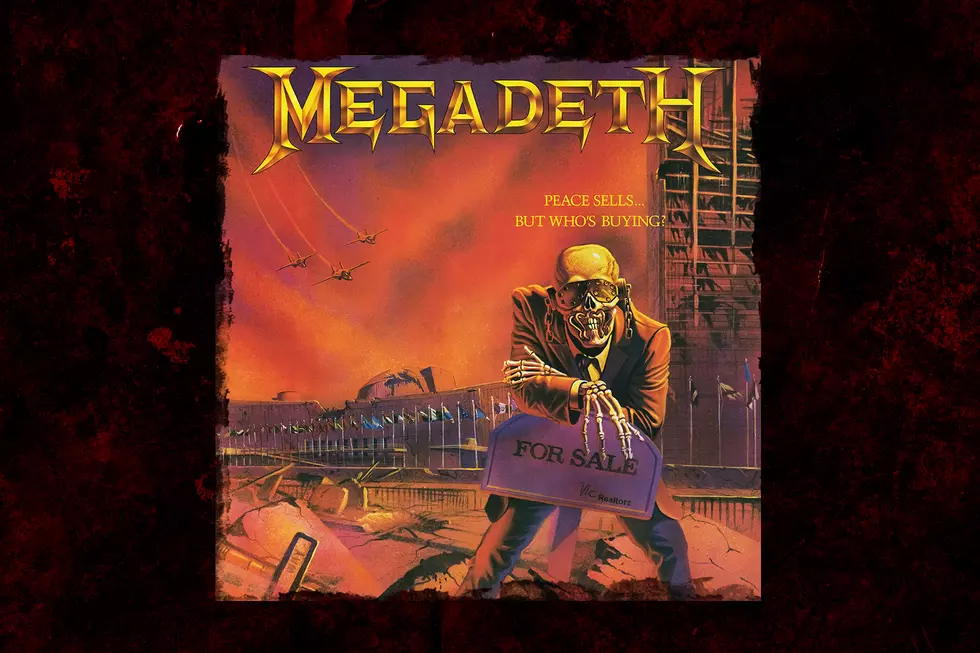
35 Years Ago: Megadeth Bring the Thrash With ‘Peace Sells… But Who’s Buying?’
As a founding member of Metallica and a major contributor to the band’s groundbreaking debut Kill ‘Em All, Dave Mustaine was clearly a gifted songwriter and a talented musician. However, his first effort to reach the top of the thrash metal hierarchy with his band Megadeth, 1985’s Killing Is My Business… And Business is Good, suffered from sub-par production and it lacked the stand-out hooks to catapult the band to stardom. Fifteen months later, on Sept. 19, 1986, Mustaine and his bandmates followed-up their debut with the exceptional, catchy and powerful riff-fest Peace Sells… But Who’s Buying?
The band started working on two of Mustaine’s compositions, “Black Friday” and “Black Omen” as early as December 1985, but most of the heavy lifting for Peace Sells took place after Megadeth finished touring in support of Killing Is My Business. Again, Mustaine wrote all the songs and the caliber and quality of his new material was leaps and bounds above anything he had ever done.
“Megadeth was capable of extraordinary musicianship,” he wrote in his memoir Mustaine. “The twin guitar attacks on ‘The Conjuring,’ the great harmony line in ‘Peace Sells’ were achieved not only through careful composition, but through the camaraderie that comes when a band is really clicking.”
Megadeth, "The Conjuring"
That Megadeth clicked so well is amazing considering the physical condition all of its members were in. Guitarist Chris Poland and drummer Gar Samuelson were addicted to heroin and sometimes pawned the band’s equipment for money to score dope. Bassist David Ellefson and Mustaine weren’t in the throes of addiction, but they were heavy users. To a large extent, Mustaine and Ellefson started abusing narcotics because they were living in barely tolerable conditions and were basically penniless.
“I was living in a building called the complex, which is where all the bands used to rehearse,” Mustaine told me in 1999. “The place was by the meat packing plants and it was a dive. David Ellefson had found some unsuspecting victim to live with. This was the singer from Détente, [Dawn Crosby]. Dave and I went over to her house one time and the sink in her bathroom looked like the sink in a gas station – and the same with the toilet. And Dave would tell me nightmares of him being over there, and her making him sleep on the floor while she had sex with another girl.”
Megadeth was still under contract with indie label Combat Records when it started recording Peace Sells… But Who’s Buying? at The Music Grinder Studios in Los Angeles on Feb. 15, 1986. Mustaine co-produced the album with Randy Burns, and the group exited the studio March 20. While the budget was scant, the albums sounded much fuller and more professional than the band’s debut. Before the album was released, Combat sold Megadeth’s contract to Capitol Records, which hired engineer Paul Lani to fix the recording flaws and give the record a crisper bite.
Clearly, songs like the chant-along “Wake Up Dead” and the barreling, graphically brutal “Good Mourning/Black Friday” were next level stuff, but the obvious standout was the title track. From the opening jaunty bass line to the contagious main riff, “Peace Sells” remains one of the most memorable numbers from the thrash era. The vocals were snarky, but political, proving the Mustaine had more than tales of decadence and mayhem in his lyrical arsenal, and the rhythmic shifts in the song gave it lasting impact.
Even MTV picked up on the appeal of “Peace Sells,” using the bass intro for its MTV News reports for nearly 10 years. Though Peace Sells… But Who’s Buying wasn’t as musically intricate as Megadeth’s tech-metal masterpiece 1990’s Rust in Peace, it featured more challenging rhythm and tempo shifts, and more guitar fills and better leads than most early speed metal and thrash releases. And the album cover blew away Killing, establishing the band’s mascot Vic Rattlehead as an iconic metal figure right up there with Iron Maiden’s Eddie the Head.
Megadeth, "Peace Sells" Music Video
Art for the album was rendered by Ed Repka, who also rendered classic covers for Death as well as model designs for the “Hellraiser” films. “The jacket art arose from a lunchtime conversation at a rib joint in New York, across the street from the United Nations,” wrote Mustaine. “I was there with our agent, Andy Summers, and we started brainstorming. By the end of that conversation we had come up with the idea of Vic standing in front of the UN, shortly after a nuclear holocaust, trying to sell property. That became the quintessential Peace Sells image.”
Megadeth toured extensively for Peace Sells and the album reached No. 76 on the Billboard album chart. After the tour, however, Mustaine fired Poland and Samuelson because their drug problem was impeding the forward progress of the band. Peace Sells was certified gold in November 1988, and went platinum four years later.
Loudwire contributor Jon Wiederhorn is the author of Raising Hell: Backstage Tales From the Lives of Metal Legends, co-author of Louder Than Hell: The Definitive Oral History of Metal, as well as the co-author of Scott Ian’s autobiography, I’m the Man: The Story of That Guy From Anthrax, and Al Jourgensen’s autobiography, Ministry: The Lost Gospels According to Al Jourgensen and the Agnostic Front book My Riot! Grit, Guts and Glory.
See Where 'Peace Sells' Ranks Among Our Top 50 Thrash Albums of All Time
More From 94.1 KRNA










